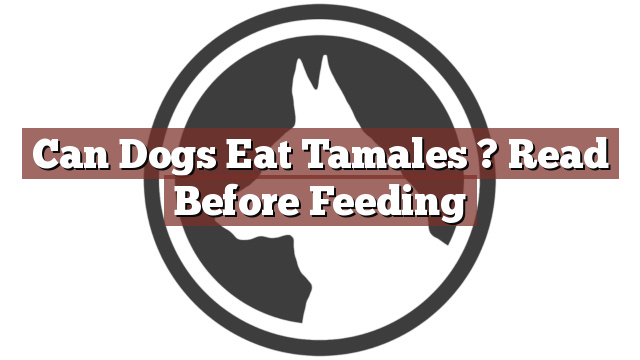Understanding Your Dog’s Dietary Needs
As a responsible pet owner, it is crucial to be aware of the dietary needs of your furry friend. Dogs have specific nutritional requirements that must be met to ensure their overall health and well-being. While it is common for dogs to enjoy sharing our meals, it is important to remember that not all human foods are safe for them to consume. Feeding your dog an inappropriate diet can lead to digestive issues, nutrient deficiencies, and even serious health problems. Therefore, it is vital to educate yourself about what foods are suitable for your canine companion.
Can Dogs Eat Tamales? Read Before Feeding
Can dogs eat tamales? This is a question that may arise if you are contemplating sharing this traditional Mexican dish with your furry friend. However, it is crucial to understand that tamales are not an ideal food choice for dogs. Tamales typically consist of a corn-based dough called masa, which is stuffed with various fillings such as meat, cheese, or vegetables. While some components of tamales may be safe for dogs, there are certain ingredients and aspects of this dish that may pose a risk to their health.
Pros and Cons of Feeding Tamales to Your Dog
Pros: Tamales may contain ingredients that are safe for dogs, such as plain corn masa or small portions of lean meat. Corn masa is a gluten-free and easily digestible grain source for dogs. Additionally, lean meats can provide dogs with protein, which is vital for their muscle development and overall health.
Cons: Despite the potential benefits, several aspects of tamales make them an unsuitable choice for dogs. Many tamales contain seasonings, spices, and other ingredients that can be harmful to dogs. Common seasonings like garlic and onions are toxic to canines and can cause damage to their red blood cells. Moreover, the fillings in tamales, such as cheese or spicy ingredients, can lead to digestive upset, allergies, or even pancreatitis in dogs.
Conclusion: Exercise Caution When Considering Tamales for Dogs
In conclusion, it is not recommended to feed tamales to your dog. While certain components of this dish may be safe and beneficial, the potential risks outweigh the benefits. Dogs have different nutritional needs and sensitivities compared to humans, and their digestive systems may not be able to handle certain ingredients found in tamales. It is always best to consult with your veterinarian before introducing any new food into your dog’s diet to ensure their safety and well-being. Remember, a balanced and appropriate diet tailored to your dog’s specific needs is crucial for their overall health and longevity.
Thank you for taking the time to read through our exploration of [page_title]. As every dog lover knows, our furry friends have unique dietary needs and responses, often varying from one canine to another. This is why it's paramount to approach any changes in their diet with caution and knowledge.
Before introducing any new treats or making alterations to your dog's diet based on our insights, it's crucial to consult with a veterinarian about [page_title]. Their expertise ensures that the choices you make are well-suited to your particular pet's health and well-being.
Even seemingly harmless foods can sometimes lead to allergic reactions or digestive issues, which is why monitoring your dog after introducing any new food item is essential.
The content provided here on [page_title] is crafted with care, thorough research, and a genuine love for dogs. Nevertheless, it serves as a general guideline and should not be considered a substitute for professional veterinary advice.
Always prioritize the expert insights of your veterinarian, and remember that the health and happiness of your furry companion come first.
May your journey with your pet continue to be filled with joy, love, and safe culinary adventures. Happy reading, and even happier snacking for your canine friend!

